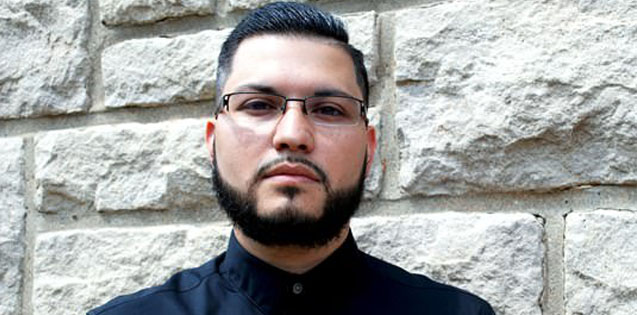When most people think of Southern Baptist pastors, rapping usually isn’t the first thing that comes to mind, but D.A. Horton shatters that expectation and many more with his outreach to urban areas that are similar to the ones in Kansas City, Missouri and Atlanta, where he grew up.
In addition to using rap as a medium for teaching theology, Horton’s work for the Southern Baptist North American Mission Board gives him the opportunity to disciple young Christians on how to live in a way that preaches the Gospel. In doing so, he encourages believers to break out of their comfort zones and love the people who live in the urban communities that are often abandoned by the church.
Horton also stands out because of his willingness to address racial tensions that often remain unspoken until they boil to the surface in tragedies like the Trayvon Martin shooting or the more recent police shooting that ended in the death of a black teenager in Ferguson, Mo. We had a conversation with Horton about race and the church, among other things, and what he had to say was enlightening.
1. You aren’t afraid to touch the third rail of race and the church, but Christianity Today recently reported that, according to a study by the Association of Religion Data Archives, 69 percent of white evangelicals believe that race relations will improve if we just stop talking about it. Why is it important for the American church to have a conversation about race?
In recent years, a resurgence regarding the centrality of the Gospel has become reality. As we look at the mystery of the Gospel, it becomes evident that you can’t champion the Gospel without highlighting the fact there’s cultural, ethnic and socioeconomic diversity within the Body of Christ (Ephesians 2-3). We are one spiritual ethnicity made up of people from every nation, tongue and tribe.
We must address our poor stewardship of the Gospel seen in our nation’s history, as sins such as slavery and segregation were legitimized by bad theology. We must refrain from ignoring this history yet, at the same time, not idolize it. Talking through our history provides us with a launching pad that elevates a Gospel-centered solution that ensures the mistakes of the past won’t be repeated.
2. Speaking as a civil rights attorney, I’ve found that working in the realm of social justice makes it easy to get on my high horse sometimes and start feeling a little self-righteous. How do you avoid getting prideful when operating in your calling and speaking the truth?
God uses His Word and answered prayer to humble me. When I look intently in the Scriptures, the Holy Spirit highlights my carnality and sin. When I’m not looking at Scripture, I’m denying God’s process of sanctification that He uses to examine the motives of my heart after I’ve ministered to the oppressed. It’s in those moments selfishness remains hidden.
Selfishness, when left alone, gives birth to false humility and doesn’t become evident until I know that I’m doing ministry to be seen, rather than simply being seen as a byproduct of doing ministry among the oppressed. When God exposes this condition in my heart, I confess my sin, receive forgiveness, and ask Him to remove this poison from my heart (1 John 2:8-10). The result of this process is humility.
3. A lot of affluent Christians see some of the brokenness in impoverished communities, and they find themselves somewhere between not knowing how to help and not wanting to get out of their comfort zones. What are some practical — but not overwhelming — ways they can start moving that direction?
First step: pray. Ask God to plant His grief for the oppressed in your city in your heart and challenge those in your church to do the same. Next, ask God for wisdom regarding a specific area of town you can commit to regularly minister in. Then, work to identify a healthy church to partner with. Contact them, and ask how you can serve alongside them. Lastly, mobilize peers and leaders from your church to go as frequently as God leads to serve alongside the church you have partnered with. It would do you well to keep in the forefront of your mind that all your evangelistic efforts must point the people to a healthy local church in their immediate area that will follow through with them.
4. We recently had a large conference for our unmarried readers, and a substantial number of the attendees were women of color. Many of them feel like their prospects for marriage are particularly grim. What encouragement do you have to offer these women?
In the midst of what seems like a grim outlook for Christians who are single, remember this truth: God is sovereign over your marital status. Take heart and be encouraged! God has called you to make disciples, and this calling is not dependent on your being single or married. It hinges on the fact you are born again (2 Corinthians 5:17).
At the same time I would challenge you to lean on God’s sovereignty as you pray Psalm 37:4 by asking God to place His desires for your life in your heart. Then, as you live out your disciple-making call, you will be prepared when He intersects with your life the person He has for you to be equally yoked with, as you both are in Christ (Matthew 28:19-20, Colossians 3:3).
5. What impact do you think the absence of fathers has had on minority communities in America?
There are two types of fatherlessness in minority communities: absentee fathers, who do not live in the home, and apathetic fathers, men who do live in the home but are not engaged with their children. Both of these realities inflict father wounds in the hearts of countless minority children. Since God’s design for the nuclear family includes one man and one woman (Exodus 20:12) there is an innate sense of need for presence from both parents in the life of a child. When one parent (or both) is absent, the child’s need of presence remains, and with no guidance, they will fill that void with something or someone. Attempts are often made to fill the void with unhealthy emotional or sexual relationships and various substances to numb the pain of rejection.
Unfortunately, role models for manhood are scarce, so a resurgence of biblical manhood is needed now, more than ever, and it especially needs to come from men who live in those areas.
Thanks for your insight, D.A. If you’d like to hear more from D.A., check out his books about evangelism and discipleship, G.O.S.P.E.L. and DNA: Foundations of the Faith. You can follow D.A. @da_horton.












